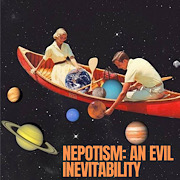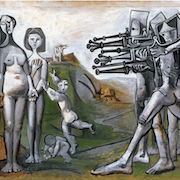|
mycomancy posted:Wait, I'm confused. Did FDR read an English version that toned Hitler down to be more acceptable to a liberal capitalist? Is that what I'm reading? If it is around 300 pages it is, the original is rather large at 720-800 pages. Supposedly, there is only one full translation of Mein Kampf in English and the vast majority you would see in most public libraries/bookstores is the abridged version. Also, supposedly all the abridged versions are very poorly translated. It sounds like FDR read both the original and at least looked at the abridged version. (Supposedly FDR knew both German and French from a young age.) Ardennes has issued a correction as of 23:04 on May 28, 2021 |
|
|
|

|
| # ? May 26, 2024 09:48 |
|
An unabridged English version was first published in February of 1939, and it too had its flaws. All the English translations smooth over the worst of Hitler’s prose, which isn’t exactly a good thing when it’s the manifesto of a madman.
|
|
|
|
https://mobile.twitter.com/robkhenderson/status/1398322044685725700
|
|
|
|
Spangly A posted:the guardian just ran a series celebrating their 200th birthday. One of the segments was how they changed their personal ads section into a refugee section during the holocaust, and there's hundreds of adverts from jewish people writing in "please take my kids, they are lovely, we're getting systematically murdered by the nazis". The segment was written by one of the kids who was rehomed from the ads section. My extended family settled in many areas in South Dakota, where a lot of German POWs were put in agricultural production camps. My Great Grandfather, a Lutheran Pastor, who still spoke German at home with my Grandfather and other 11 children became a Minister/spy to them after being asked to by the Army. He would spend time with them after preaching, and would take confessions from some of the Catholic soldiers. He learned about what was going on from soldiers captured in Africa in late 1942 about how Jews were being killed wherever they were found. He was told in 1943 about bunch of Tunisian Jews that were graphically killed by the Nazis. In early 1945, he learned first hand about the Death camps from captured POWs. He was told by the Army not to talk about it during the war, and even afterwards. My Great Uncle, from my Grandfather's family of 12 kids was slightly younger than my Grandfather, and was not 18 until early 1945. He was stationed in Germany after the war. My Great Grandfather told him about what he learned before he left for Germany. My Great Uncle Herman stated that even in areas that were not close to eastern Germany, the civilian population around Essen knew all about the camps, because it was such a big industrial center, that Essen, sometimes had more Concentration Camp POWs and Jews doing forced labor in manufacturing than the German population of Essen itself. Both my Great Grandfather, Great Uncle, and Grandfather were before the war, very proud of their German heritage. The town they lived had English as a second language till the late 1940s (when people switched speaking German at home) and a Weekly German Language Newspaper published until the 1970s. After learning about these things, they really lost their love of Germany, and were very disenchanted with the fast recovery of Germany and the way that only 10 years after the war, it seemed like all was forgiven and forgotten as along as West Germany was on our side. My Grandpa and Great Uncle Herman stopped saying his was German, and instead insisted he was French, because we hail from the Alsace-Lorain area of Europe, which has historically been exchanged between Germany and France for the past 500 years. My Grandfather was a SeaBee in the navy. He told a story about how after some Pacific Islands were taken, a few Japanese soldiers would still be running around taking pot shots at them. On one Island (don't remember the name, was 20-25 years ago when he told me) some of the Japanese stole Navy and Army uniforms out to dry and tried to sneak into line to get chow one day. He said they were taken outside and shot. He said this happened more than once. He was actually quite angry about Japan getting off so lightly after the war. I know part of it was racism, but the other part was how horribly they treated their POWs and civilians they encountered. The way the Japanese treated women during the war horrified him. He said that finding the corpses of civilian women was the worse part of his job as a SeaBee when landing on freshly taken or contested islands. I know he spent a year in the Philippines in1945 helping rebuild infrastructure. He refused to talk about his experiences after he stated that.
|
|
|
|
The marginalia in Roosevelt's copy specifically states that they have left something out of the translation. Roosevelt lived and schooled in Germany as a child or teenager
|
|
|
|
https://mobile.twitter.com/AmazingPosts_/status/1381908445608226816
|
|
|
|
https://twitter.com/MarieMyungOkLee/status/1406973327256784899
|
|
|
|
https://twitter.com/CaseyHo/status/1406670793791053827
|
|
|
|
https://twitter.com/Hesp365/status/1406775136712216577 lol this loving rear end in a top hat
|
|
|
|
his calling attention to that discrepancy is now making me seriously wonder why our official figures for napalm use are so comparatively low because no one disputes that the united states destroyed literally every multistory building in korea and its hard to imagine that twenty times as much napalm with an extra ten years of research and development could somehow do less damage to vietnam
|
|
|
|
milhist question: listening to revolutions and the description of the brusilov offensive kinda sounds like a proto-deep battle strategy; was that an explicit inspiration?
|
|
|
|
Deep Battle includes elements of modern combined-arms and maneuver/mechanized warfare - the Brusilov Offensive isn't really comparable because too few elements of these existed (most importantly tanks and aircraft) as of 1916. What we can say is that it exhibited elements of maskirovka, which we know Russian military thinkers taught and practiced at the time. Further, the use of a short, sharp artillery barrage instead of a prolonged bombardment, as well as some version of infiltration tactics, were advances in tactical doctrine that all belligerents eventually came to in WWI. Some excerpts from Normal Stone's "The Eastern Front, 1914-1917": quote:The gathering was heartened by Brusilov. He said he would attack in the summer, that he would need only trivial reinforcements in men and guns. Kuropatkin ‘looked at me and shrugged his shoulders, in pity’. Brusilov was told to go ahead, although, since he had not much superiority of any kind—except leadership—over the Austrians, no-one expected from his offensive much more than a tactical success, and quite possibly only a repetition of the Strypa failures. Yet Brusilov’s team had come up with new ideas that made for the most brilliant victory of the war. They had studied the failures of December and January, which—as Zayonchkovski says—served something of the same purpose as the Russo-Japanese war had done. In reality, the Russo-Japanese war had led men often enough merely to a more vigorous repetition of the same views as before, whereas Brusilov’s command seems to have thought things out radically. Whatever the reason, these men came onto methods that were used—without acknowledgment—by Ludendorff in 1918, and then by Foch. To some degree, these new methods were forced on Brusilov by his very weakness. He could not hope for a crushing superiority of shell, and so had to think things out in other terms; in a sense, he had an advantage of backwardness, of being forced to move from 1915 to 1918 without passing through the stage of sacrificial Materialschlachten between them. The Brusilov Offensive stands out because it was the most competently-lead and planned operation of the Russian Imperial army, but it was no Deep Battle.
|
|
|
|
i was reading a bunch of wikipedia articles on mao - incidentally there is absolutely no consistency in the death estimates between the pages for, say, the cultural revolution, the great chinese famine, the great leap forward, Lysenkoism and individual people involved even when talking about the exact same event, one will say so and so million died and the next page will be ten times that number it's utterly wild- when i found this on the page for mao's fourth wife and gang of four member of many names Jiang Qing. there is this utterly bonkers section in her biography that isn't repeated on the "Death of Mao" or on Mao's page:quote:Death of Mao Zedong i mean that's a mess of citation neededs so i can't read where on earth this is coming from, has anyone heard it or have more insight on it? it reads like some kind of insane conspiracy theory lol
|
|
|
|
CoolCab posted:i was reading a bunch of wikipedia articles on mao - incidentally there is absolutely no consistency in the death estimates between the pages for, say, the cultural revolution, the great chinese famine, the great leap forward, Lysenkoism and individual people involved even when talking about the exact same event, one will say so and so million died and the next page will be ten times that number it's utterly wild- when i found this on the page for mao's fourth wife and gang of four member of many names Jiang Qing. there is this utterly bonkers section in her biography that isn't repeated on the "Death of Mao" or on Mao's page: Did Mao get offed by someone sprinkling fentanyl on him?!
|
|
|
|
mycomancy posted:Did Mao get offed by someone sprinkling fentanyl on him?! i want to know if there was some clique or book or something that claims that mao's once bougie actress wife chokeslammed him through the operating table while the medical staff loudly declare him broken in half.
|
|
|
|
https://twitter.com/RyanHaecker/status/1420364758583291909
|
|
|
|
https://twitter.com/myhlee/status/1424408424880635911 this is worth reading not because its good but because theres a whole lotta unexpected yikes in here in terms of douglas making casual racisms and acting like antichinese prejudice is bad mainly because its poor business sense
|
|
|
|
So if you listen to revolutions podcast Mike Duncan has apparently composed a punk rock opera about the French revolution.
|
|
|
|
great, now you can listen to him saying de Tocqueville was right but there are three chords now
|
|
|
|
I was going to make a thread for stupid alternate histories, but I might as well use this one. Suppose the German princes who historically tried to reestablish the monarchy during the Weimar Republic hooked up with the Nazi movement and rode its coattails back to power, winning the monarchist and conservative vote against Hindenburg in 1932. While in power, crown prince Wilhelm starts cracking down on socialists, and turn on the Nazis. How then would history remember the fallen National Socialist movement, and Hitler?
|
|
|
|
Maximo Roboto posted:I was going to make a thread for stupid alternate histories, but I might as well use this one. Some random loons like Golden Dawn or Casa Pound that barely anyone talks about nowadays.
|
|
|
|
Maximo Roboto posted:I was going to make a thread for stupid alternate histories, but I might as well use this one. both the socialists and nazis had massive popular support and huge paramilitary organizations backing them up, so what you're proposing here almost certainly means civil war and that's one that the monarchists aren't winning
|
|
|
|
Maximo Roboto posted:I was going to make a thread for stupid alternate histories, but I might as well use this one. imo it's not a very plausible alternative, because the princes riding the Nazis' coattails would in all probability be more like the princes bringing a little bit of monarchist/conservative credibility to the Nazis rather than the Nazis bringing their large Depression-era following to the monarchists. Taking some of the conservative vote from Hindenburg in 1932 might mean Hitler taking power a year early, but it would be very unlikely to mean Hitler not having the nomination against Hindenburg in the first place.
|
|
|
|
https://mobile.twitter.com/janecoaston/status/1426279588661973007
|
|
|
|
I'm not going to try and answer Maximo Roboto's question directly, but I did want to provide some context as to how the Kaiser viewed Hitler and the Nazis:    ___  taken from "The Kaiser: Warlord of the Second Reich", by Alan Palmer
|
|
|
|
https://mobile.twitter.com/antoniogm/status/1426755420794757122
|
|
|
|
Is there a good audiobook or podcast for a complete history of the soviet union?
|
|
|
|
the bit that gets left out of this story is that the British came back, burned every village on the way to Kabul, bombed the ancient city center into rubble, and then hosed off to let their puppet die once they'd gotten all the rape and murder out of their system
|
|
|
|
just found a superior thread that gets into that in much better detail https://twitter.com/justinpodur/status/1427319555085553664
|
|
|
|
username tweet combo https://mobile.twitter.com/Jiteshjustcool/status/1427513878062141441
|
|
|
|
https://mobile.twitter.com/LemieuxLGM/status/1431696932133507074
|
|
|
|
https://twitter.com/mmabeuf/status/1433595798235885575 https://twitter.com/mmabeuf/status/1433597396613832706 The thread goes on for a bit longer on, if you're interested This also got me to dig out my copy of James William Gibson's "The Perfect War: Technowar in Vietnam":    
|
|
|
|
my go to historian blog, A Collection of Unmitigated Pedantry, finished writing up a series about Victoria 2 and the historical context of the game mechanical decisions. I figured it might be interesting to read for people here. https://acoup.blog/2021/08/13/collections-teaching-paradox-victoria-ii-part-i-mechanics-and-gears/ He also wrote some stuff about the use of chemical warfare in post ww1 combat, which is a good look at why international law is shaped the way it is and also covers some of the basics of some modern combat doctrines and how/why they're applied. https://acoup.blog/2020/03/20/collections-why-dont-we-use-chemical-weapons-anymore/
|
|
|
|
That Victoria 2 post is extremely my poo poo, thanks for sharing it. The way Paradox games have represented history, especially over different versions of the game is really interesting and you can see how the changing influences of what the devs are probably reading. EU4 going from the old Westernization decision to Institutions was a notable one.
|
|
|
|
I really liked that guy's incredibly long posts about representing or misrepresenting medieval warfare in Lord of the Rings, so I will definitely check out the Victoria one, thanks for the reference.
|
|
|
|
Dreylad posted:That Victoria 2 post is extremely my poo poo, thanks for sharing it. The way Paradox games have represented history, especially over different versions of the game is really interesting and you can see how the changing influences of what the devs are probably reading. EU4 going from the old Westernization decision to Institutions was a notable one.
|
|
|
|
A Buttery Pastry posted:The thing they're reading is the Paradox thread in games. By heroically calling them Euro/Swedocentric until the non-goon sourced devs largely stopped posting, we have forced them to address the ideological blind spots of their games. Goon entryism has also resulted in Marxist control over the Victoria franchise, the team lead being our very own Wiz, wresting it out of the hands of a Thatcherite. Games is the true vanguard of the revolution. until the Stellaris thread started accusing Wiz of racism over immigration mechanics lol also the Battle of Blair Mountain is nuts. imagine gathering together all your unions and allies to face off against company strikebreakers and associated corrupt sheriffs and the loving air force shows up and bombs you
|
|
|
|
theres a quote i once read of a polish man speaking to the Austrian Empress and the Empress asking him if he was polish, and the man answers "No, Galician", and the Empress looks at him sadly. anyone know the source?
|
|
|
|

|
| # ? May 26, 2024 09:48 |
|
https://mobile.twitter.com/dfedman/status/1434732371597615113 https://mobile.twitter.com/dfedman/status/1434732380036550664 edit wrong tweet Some Guy TT has issued a correction as of 02:06 on Sep 7, 2021 |
|
|




















